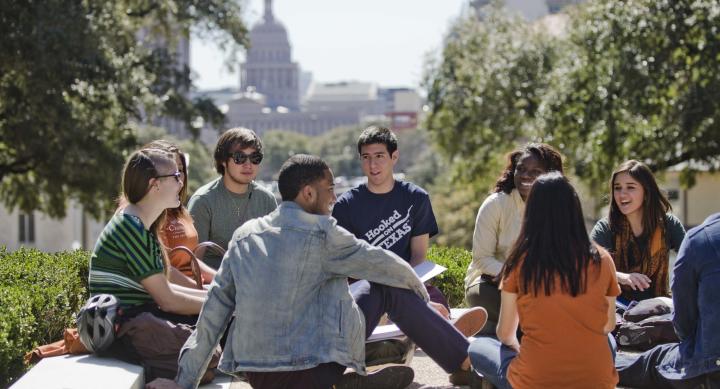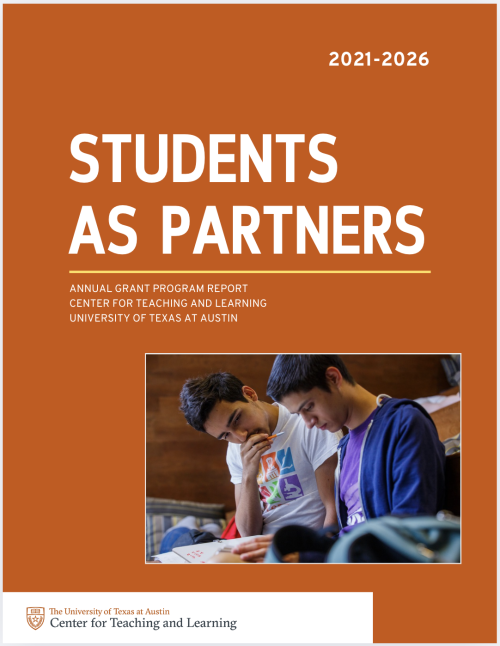
Submissions for Fall 2026/Spring 2027 Applications: Due Friday May 4, 2026
Area of Emphasis (2025-26): Designing Patterns of Learning
How can we begin to design "patterns" of learning that can be adopted to many different kinds of learning contexts, depending on the needs of the course and the pedagogical models of the instructor? According to Diana Laurillard, good teaching can be designed within a 'conversational framework' that facilitates dialog between instructors and students. Processes that can be found in this framework are as follows:
Discursive process: The teacher introduces a new concept to the student, a dialogue begins between the teacher and the student, where each participant describes and redescribes their understanding of the concept.
Adaptive process: Students modify and adapt their actions based on the goal, feedback, and what they have learned through the discursive process. Similarly, teachers modify and adapt the task based on the discursive process with their students.
Interactive process: The teacher gives the student a task, the student completes the task and receives feedback on their performance. The student then modifies their actions to complete the task goal.
Reflective process: Both the teacher and student reflect on the interaction. They adjust their thinking on the concept and consider future actions.
While the CTL welcomes any and all applications, we are looking especially for projects that have the following general characteristics for the upcoming year:
- Developing sequences within courses that emphasize the connectivity between instructors and students in designing effective teaching that highlights deep and sustained communication, especially patterns that leverage the use of UT-available learning technologies
- Discussing course-based or disciplinary-specific policies that inform how we construct learning patterns for all students
- Understanding how decisions around teaching impact the quality of learning for all students
- Ensuring every student has access to and the ability to assess technologies that nourish and challenge them, both ethically and creatively, in their learning and in working with their peers.
- Exploring the place of new and emerging technologies (i.e., generative AI) within patterns of learning, with an eye to exploring concrete learning outcomes
This means that the project should:
- Be designed to improve student success at UT-Austin
- Focus on making positive, innovative and ethical choices in instruction to benefit all students
What are "Students as Partners" grants?
The CTL is pleased to offer two grants (at a maximum of $2500 per grant) for "Students as Partners" work for the upcoming academic year. Please see our page, "Students as Partners Initiative" for more information about how we define this area of pedagogical innovation.
What kind of funding is available?
NEW: Each submission is eligible to receive up to $2500 per project. The CTL is offering this grant for Fall 2025 and Spring 2026 courses or initiatives. It is anticipated that the work will be completed within one academic term. Groups that have already received a SaP grant are welcome to reapply but first-time applicants will receive preferred consideration.
In addition to related expenses, the funds of successful recipients are used to pay instructor and student partners. Grantees will be paid via a one-time payment.
Who is eligible to act as a "partner?"
All faculty members and instructors working on relevant teaching projects are eligible to participate in the students as partners grant program. Preference will be given to proposals that are not already being funded by existing CTL grant programs or Provost Teaching Fellows projects.
The program is restricted to part-time or full-time undergraduate students enrolled and continuing in a UT academic program. Students must remain in good academic standing throughout the duration of the program. Before submitting a proposal, please contact the CTL with additional questions about eligibility.
How should I begin to assemble a viable proposal?
Faculty members and instructors interested in this program are encouraged to identify an undergraduate student partner or partners with whom they feel that they can collaborate. For example, students who have successfully completed a course that they have taught, a student they have worked with before, or a student who has expressed interest in collaborating with them would be ideal candidates. Aside from requesting that student partners be in good standing, the CTL will not vet or select student partners – this is the sole responsibility of the faculty or instructors - but we are happy to discuss possibilities in advance of submitting a proposal.
Once the student partner has been selected, the standard and nature of work should be established in partnership between the faculty or instructor and the student(s) to outline the responsibilities and scope of the collaboration. It is anticipated that the CTL will help facilitate the discussions and innovations that form the basis of the work.
What are the evaluative criteria for grant proposals?
Faculty members and instructors, along with a student partner or partners, should jointly complete the online application. Proposals will be evaluated based on the following criteria:
- The strength of the partnership between the faculty member or instructor and student(s). (Is the student considered as a true collaborator and partner?).
- The scope and appropriateness of the project/initiative being proposed.
- The opportunities for rich, collaborative learning by both the faculty member or instructor and student(s).
- How the partners intend to communicate their work (via events organized by the CTL, blog posts, social media, and impact reports).
Members of the CTL will review proposals and make selections based on above criteria.
How do I apply? What is required for the application?
To help you get ready, here is the information we are requesting:
- A list of course(s) and/or projects that will be the focus of the work.
- Brief description of your idea for enhancing teaching and learning within your class[es] or projects and how the grant would help you realize this vision. [Max: 400 words].
- Select how you would prefer to share the impact and outcomes of the work (see below).
What is the schedule for submission?
Proposals may be submitted through our webform. Submissions are due by May 2, 2025.
What ways can I give back to my UT colleagues?
We believe in paying things forward to the benefit of your colleagues at UT, so we are looking for ways for you to help others enhance their teaching and learning for the success of their students:
- Write a CTL News Post about what you learned.
- Co-present at a Teaching and Learning workshop with the CTL.
- Co-present within your department or college with the CTL.
- Provide examples of your work that could be placed within the CTL website.
- Be interviewed on camera by the CTL.
If I have further questions, whom do I contact?
For further questions, contact Matthew Russell
References
Laurillard, D, 2002. Rethinking University Teaching: A Conversational Framework for the Effective Use of Learning Technologies, 2nd edition. London: Routledge.
2025-26 Grantees (Current)
Luke Williams (Theatre and Dance, College of Fine Arts)
Brian McInnis (School of Information)
Adrien Smith (Department of Germanic Studies, College of Liberal Arts)
Past Grantees
2024-25 Grantees:
John Greil (UT School of Law)
Nina Telang (Department of Electrical and Computer Engineering, Cockrell School of Engineering)
Nina Palmo (Department of Sociology, College of Liberal Arts)
2023-24 Grantees:
Katherine Freer (Theatre and Dance, College of Fine Arts)
Gwendolyn Stovall (Department of Molecular Biosciences, College of Natural Sciences)
2022-23 Grantees:
Sarah Ozuna/Lara Pauley (School of Human Ecology/ Human Development and Family Sciences, College of Natural Sciences)
Honoria Starbuck (Arts and Entertainment Technology, College of Fine Arts)
Christopher Biggs (Marine Science, College of Natural Sciences)
Leta Diethloff (School of Undergraduate Studies)
2021-22 Grantees:
Tonia Guida (College of Natural Sciences)
Brian Fonken (College of Liberal Arts Career Services)
Marilyn Felkner (Public Health, School of Human Ecology, College of Natural Sciences)
Jonathan Partridge (Biology, College of Natural Sciences)
Stephanie Cawthon (Educational Psychology, College of Education)
Anita Latham (Biology, College of Natural Sciences)


